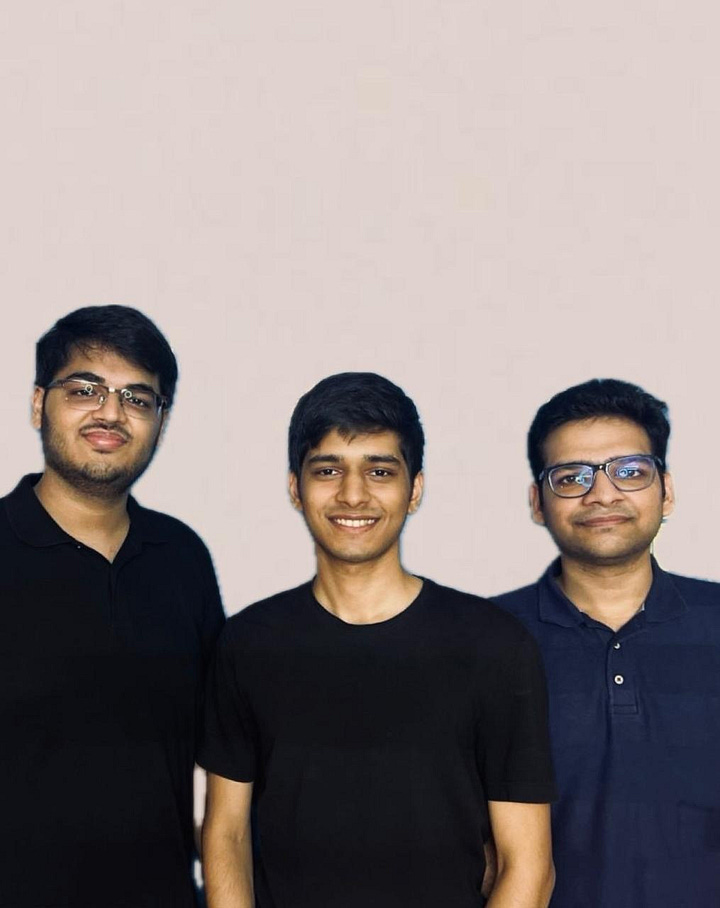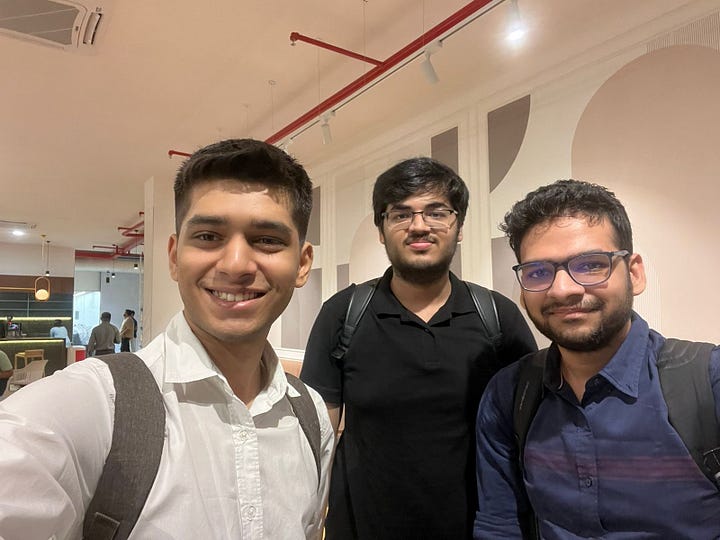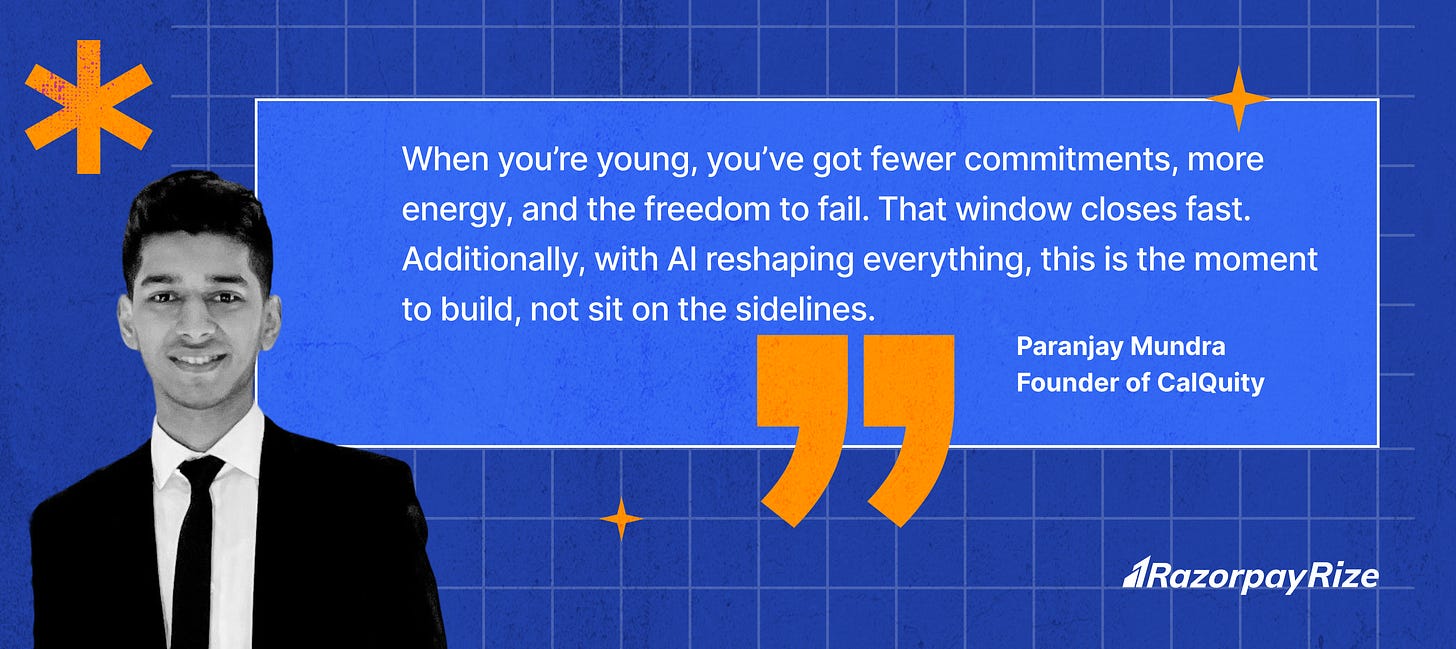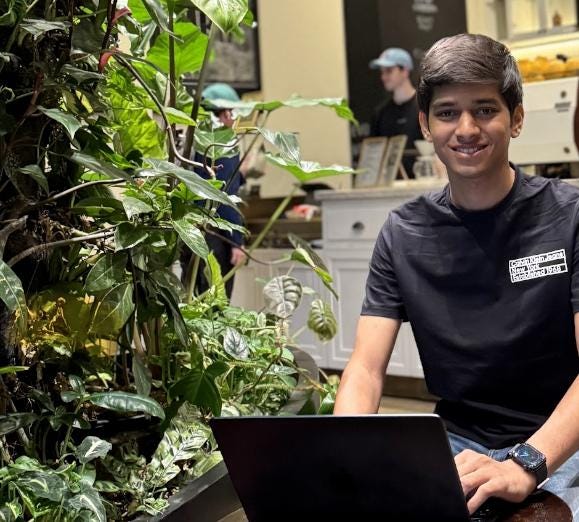3 Startups & One Shared Dream: The Story of Paranjay & CalQuity
Paranjay Mundra always knew he was meant to build. After three startups and countless lessons, he's now solving real problems for brokers and investors through CalQuity. Read the full story here.
Paranjay Mundra has always known he was meant to build. Growing up in a business family, he caught the entrepreneurial bug early. Today, he’s the co-founder of CalQuity, a fast-rising fintech startup trusted by leading financial institutions across India.
CalQuity is leading the charge in automating complex workflows and reimagining how financial intelligence is accessed, analysed, and acted upon- for everyone from everyday investors to seasoned finance professionals.
After building and exiting two startups in the D2C space, Paranjay has now found his true calling at the intersection of finance and technology.
Startup wasn’t a backup plan for me. It was always the plan.
I grew up in a business family, where conversations about global trade, consumer behaviour, and margins weren’t rare – they were dinner table staples. I didn’t realise it then, but that environment fundamentally shaped how I see the world. From an early age, I was drawn to how value is created- what people want, how systems operate, and where inefficiencies could be turned into opportunities.
While most kids were busy playing cricket or gaming after school, I was trading antique coins, collecting old currency notes, and flipping quirky items from Alibaba for a profit. At the time, I was just a kid trying to stretch my pocket money. I didn’t think much of it, but looking back, that’s probably where I picked up the basics of spotting demand, pricing things right, and finding arbitrage.
I joined college just as the first wave of COVID hit. Spotting an obvious demand for masks, I convinced my dad to let me repurpose excess fabric from one of our factories to manufacture them. That small idea sparked something bigger. It led me to launch my first proper venture in college, designing bespoke, handmade jute products for B2B clients, while also empowering rural women artisans in the process. We scaled it to ₹xM (*Confidential) in revenue before I exited after graduation. That feeling of building something real, from scratch, was surreal.
As college ended, I was fortunate enough to receive offers from the top IIMs. While I initially planned on going, I turned it down to build something I was truly excited about: Preach, a hard seltzer brand aimed at reshaping India’s F&B landscape. I made Goa my second home, perfecting the blend, the bottle, the brand. Things didn’t go as planned. Funding fell through, and we had to shut it down.
Walking away from Preach was one of the hardest decisions I’ve had to make. But it also taught me more than any textbook ever could: how to execute fast, stretch a budget, talk to real customers and most importantly, how to make peace with failure without letting it kill your appetite to build again.
Building CalQuity with My Day-Ones
Now I’m building my third startup, CalQuity, with two of my closest friends from school. We’ve known each other for nearly two decades, and over the years, we’ve built projects together, competed internationally, and developed a strong sense of how to work as a team. We bring very different approaches to the table: one’s the realist who always spots what might go wrong, one’s the eternal optimist for whom even the sky isn't a limit, and the one who usually sits somewhere in between. That dynamic keeps us steady during the tough stretches.


With CalQuity, we’re building at the intersection of finance and technology where our individual strengths align in a way that feels natural and focused.
It started with a simple observation: finance workflows haven’t changed in decades. Highly skilled professionals were spending hours digging through filings and transcripts to find a single data point. In an AI-first world, that kind of manual work shouldn’t exist.
So we started with a simple tool- a filings copilot with inline citations that surfaced answers instantly. It was scrappy, but it worked. And as users shared more of their pain points, we kept building.
Next came earnings calls. They're long, dense and often overlapping. In fact, official transcripts take 4-7 days to get published, even though markets react within minutes. Our Earnings Call Copilot changes that. It delivers key takeaways and narrative shifts within minutes of the call ending, so analysts don’t have to sift through hours of audio or wait for transcripts.
Today, we work with a wide variety of clients, including buy-side firms, sell-side firms, brokers, research platforms, and serious individual investors. Our suite includes Filings Copilot, Earnings Call Copilot, Real-Time Updates, Company Researchers, and Web Copilots, etc., each solving a specific problem. Together, they make research faster, sharper, and far less painful.
Going Bootstrapped All the Way
This might sound odd in today’s funding-obsessed startup world, but we chose to stay bootstrapped. VCs reached out, and the money was tempting, but we wanted control and time to build something useful on our own terms.
It wasn’t the easy path. Everyone around us was chasing rounds. But staying lean, listening closely to users, and shipping fast felt right. And it’s working.
If You’re a Founder, Here’s My Two Cents
If you’re building in B2B, start with two things:
Build an MVP.
Talk to your users and the people who’d actually pay.
That’s it. You don’t need a fancy deck or a viral tweet thread. You need feedback, speed, and clarity. Also, ship fast! “Done” is better than perfect. Speed might just be your only moat early on.
And If Not This… Then What?
If I weren’t building this startup, I’d be expanding my family business or building something else. I’ve always been drawn to building from scratch- not just coming up with ideas but figuring things out, scaling them, and solving real problems along the way. There’s something addictive about getting your hands dirty and watching chaos turn into something that works.
Honestly, this feels like the best time to take big swings. When you’re young, you’ve got fewer commitments, more energy, and the freedom to fail. That window closes fast. Additionally, with AI reshaping everything, this is the moment to build, not sit on the sidelines.
I don’t mind the long hours or the uncertainty. What keeps me going is that moment when someone says, “This is exactly what I needed.”
Paranjay’s journey with CalQuity is the kind of story we love: not just about spotting a market gap, but about deeply understanding the problem, talking to users, and staying committed even when the path isn’t straightforward.
We love how he’s stayed true to his instincts, choosing to bootstrap and build strong foundations first instead of rushing after quick wins. It’s a tough call, but it’s what sets great founders apart.
We’re so excited to see what’s next for Paranjay and the CalQuity team. If there’s one thing we know for sure, it’s that with this kind of passion and heart, the best is still ahead- and we’ll be right here, cheering them on!






